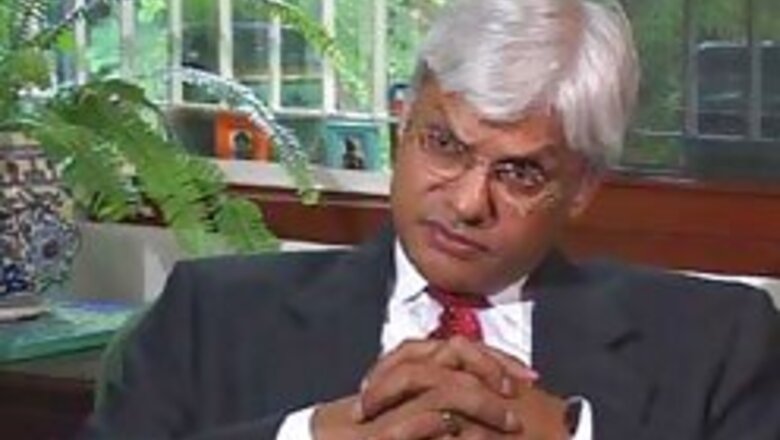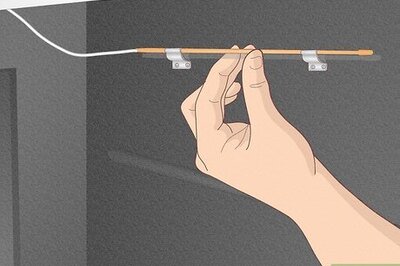
views
New Delhi: Noted US strategic expert Ashley J Tellis has said that India's emergence as a power to reckon with in South Asia was largely due to its transition from a low growth economy to a high growth one.
Tellis who played a key role in negotiating the July 18, 2005 Indo-US civilian nuclear energy co-operation agreement, termed the May 1998 Pokhran tests as the turning point that consolidated New Delhi's position on the global stage as also its relations with Washington.
Following are excerpts of the interview:
On 1998 Pokhran Tests
ANI: In 1998, India carried nuclear tests, for which we received world-wide condemnation and US imposed sanctions. Now, in 2006 we are dealing with US on the same nuclear subject. So, in today's scenario how do you see the 1998 nuclear tests carried by India?
Tellis: In retrospect, I think the tests that India carried out in 1998 turned out to be an important element that consolidated her position on the global stage. In 1998, we could not make that judgement. But looking back in retrospect, I feel 1998 was a turning point. But India's rise is not only due to detonation of the bomb, but first and foremost India's transition from a low growth economy to a high growth economy.
On Indo-US civilian nuclear deal
ANI: It has been a year since the July 18 statement was agreed upon by India and the US, so the pertinent question is when would the deal finally get ratified?
Tellis: Senator Richard Lugar has already said that the vote is most likely to take place after the August recess in the Congress, and if everything goes well, it is most likely to be in place by mid-September.
ANI: As you use the term that "if everything goes well", so what are the major irritants still left?
Tellis: There are two major irritants, a) the issue of process and b) issue of substance. Right now, the Senate calendar is full. However, the Senate leader has committed to President George Bush that they would find some time before November when Congressional elections are scheduled to be held. On the issue of substance, there have been different elements that have been either expansion or deviation from the July 18 Statement. My observation is that at the end the bill, there would be no fundamental changes that would require re-negotiations.
ANI: But Lugar has recently said that the diplomats of both the sides (India and US) should not be adamant to the changes that the bill would incorporate during its legislation?
Tellis: The changes brought by the Committee are mere expressions. Not one of them is mutually imperative that bind India. In my opinion India should be re-assured.
PAGE_BREAK
ANI: There have been criticisms of the deal both in India and US. Why according to you there are criticisms from both the sides?
Tellis: Attracting flaks from both the side shows that there is something right. In my judgement, both the governments of India and US have negotiated a very delicate piece of legislation that walks a very fine line. And, that there are people on both the sides who feel that there could be deviations that attract criticisms. I feel that both these are highly exaggerated criticisms.
ANI: If India carries a nuclear test again, will the nuclear co-operation be called off?
Tellis: If India were to detonate a bomb a decision would be taken. India finally has to decide when it decides to conduct the test, whether its decision to test is worth the cost that it has to inevitably bear.
On future of Indo-US ties
ANI: What is the future of the Indo-US relations?
Tellis: The future of the relations is extremely bright. There are three reasons for it. In recent years the principle national interests are getting more aligned on the issues of terror threats, weapons of mass destructions and energy security. In the area of economy US is clear that our growth increase depends on our ability to connect with the Indian economy. I expect that in 20 years time the trade between the two countries would increase many times.
ANI: Does China appear in the scheme of the things?
Tellis: Absolutely, China appears in the US' scheme of things, both as a potential economic competitor and possibly our future rival. But I would like to say that Indo-US relations are more broader. Whether China existed or not, there were sufficient strategic imperatives that would lead to develop strong Indo-US ties.
ANI: So, the US would like to see India as a subordinate ally?
Tellis: Whether India would turn as a subordinate ally of US or an equal ally depends on India's own economic performance. If India sustains an economic growth in capacity to US, it would turn as an equal ally. But if its economy falters, its quest for equality falters.




















Comments
0 comment